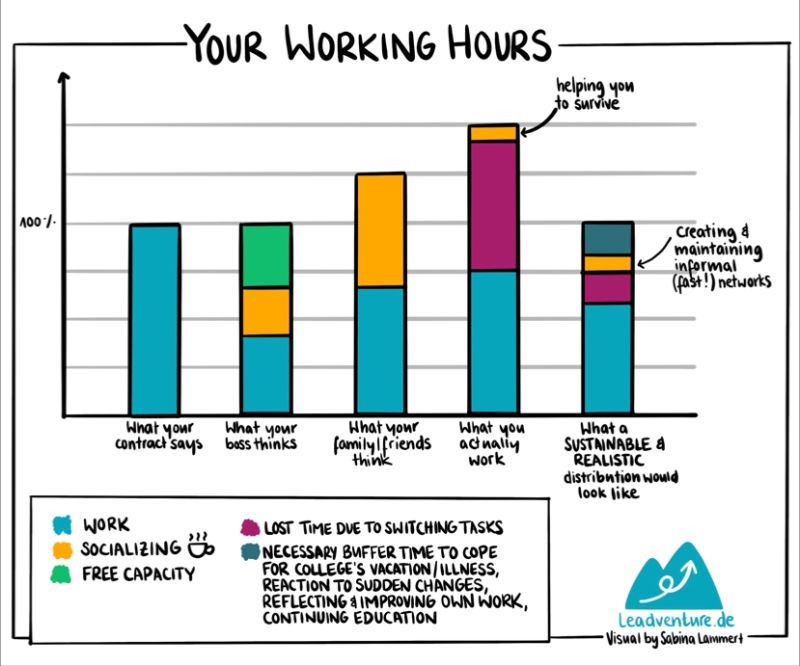Impulses for organisations – Part 6
The online world is full of tips and tricks that address aspects of collaboration in organisations. However, many postings are only visible for a short time and then disappear forever in the shallows of the various social media platforms. In part 6 of our series, I would again like to put impulses from experts in the t2informatik Blog “in the shop window”. This time it’s about learning in organisations, low-performers and intelligent working.
Here we go with the valuable impulses!
We need many more “learnfluencers” in companies!
❗People who go through the world with an open mind and gather impulses.
❗People who pass on these impulses openly and without intention.
❗People who share their learning and development paths so that we can learn from them.
❗People who are “learning pirates”.
❗People who lead by example.
❗…
In my view, such learnfluencers are key to creating an open and inspiring learning culture.
And we desperately need them in a world of work where, according to a WEF survey, 44% of the skills we have today will no longer be “usable” by 2025!
So it is up to us to create framework conditions in which our Learnfluencers can “shine”! For example, we can
💡 organise learning festivals that invite people to be inspired on very different topics.
💡 design low-threshold exchange formats such as inter-departmental learning cafés.
💡 launch tools like “Instructions for use for me” and add an item “Enthusiasm topics I can be asked about at any time”.
💡 …
What would you add? How can we create an inspiring learning culture in companies?
There are no low performers!
Just last week I heard the phrase again: “That’s just a low performer!”
Oh yeah?!
Well, blood pressure up?
Before misunderstandings arise:
Yes, there is such a thing as low performance.
The performance that falls short of expectations.
The performance that is not enough.
The performance that disappoints and could have been higher, better, stronger.
To the resolution:
It’s the old game: the separation of person and behaviour. No one intentionally and permanently underperforms.
You know counter-examples? Time to ask yourself the right questions …
Because performance is …
🚫 not a character trait.
🚫 not an identity-forming characteristic.
🚫 not a twist of fate
but
✅ a momentary observation
✅ context-dependent
✅ fluctuating
✅ a question of skills
✅ a question of motivation
✅ a question of one’s own evaluation standard
✅ the result of at least 1,001 factors
So many clever and enlightening things have already been written on the subject of performance. Feel free to drop by my friend, Wolf Lotter, and see what he has to say on the subject of performance.
And by the way: Seen in this light, the statement “What a blatant over-achiever” is not a particularly helpful perspective either.
Sorry for the dust-up. Just wanted to get rid of it for a moment!
You know: #goodwork stands for good cooperation and good results, not (only) for feelgood.
And now: Keep going!
How does your working hours distribution look like?
Yesterday I gave a workshop on agile basics and as so often following statement came up:
„We would like to work more agile but we don’t have time for it!“
It does not matter if you want to work agile or not: not having time is always a serious issue for you and your organization.
If you are continuously working on your limit, you don’t have time to react to change, which means that…
…you don’t have time to cope for vacation or illness of your colleges (and come on, by now we would really should know that this happens in a predictable manner 🤷♀️)
…you don’t have time to properly prioritizing you work leading to doing whatever comes first to your (or your manager‘s) mind, which can be the right thing to do, but often enough (if we are really honest with ourselves) it is not 🤷♀️
…you don’t have time to improve your own work, your working conditions or yourself in terms of education and being up to date in your area of expertise. Even if you want to take it slow with changes, the world does not. It is changing continuously and affecting you – if you want it or not 🤷♀️
Regular reflection and adaptation is the key to success!
There are of course more consequences one can think of, but I am sure you can already see the point I want to make.
So what’s the solution?
It is definitely NOT TO WORK MORE but smarter.
Here are some suggestions:
1) Don’t commit on too many tasks. Task switching is killing your productivity and time. Don’t get me wrong: It’s not about only doing one tasks forever. There are people (like me) who enjoy switching between tasks on a regular basis. But there is a limit to what a reasonable amount of tasks is that you can juggle.
2) Communicate CLEARLY your limits. If your boss wants you to do a tasks but you are already at your limit, make a suggestion of what you will stop doing instead or ask her to make a suggestion instead. She cannot read your mind or micromanage your tasks.
AND TO ALL THE LEADERS: Whenever you give your employee a new tasks, ask if something else need to be deprioritized. This way both parties can take over responsibility for a sustainable work environment 😌
3) ALWAYS – REALLY ALWAYS – plan some buffer time. And I am not talking about an hour per week but rather something like 15-20% of your working time. This is the only way how you can build up a resilient team/ organization/ work place. This is the only way how you can react to change without overloading your system. You don’t want EVER to be responsible for a burnout. Not for your own one and especially not for the burnout of a college. The worst thing that can happen with your buffer time is that you don’t need it in one or the other week and that you can use it for actively improving yourself, your work or for education, which all brings value to your company. At least I think that this doesn’t sound so bad 😉
What would you add to this list?
Impulses and questions
Three different topics, three people with different expertise and perceptions, three individual impulses. How do we succeed in learning in organisations and as an organisation? Why do people take performance personally, why are colleagues categorised at all and how do we create systems in which there is more time to change things for the better?
Questions upon questions. Perhaps you also have one or two; great! Then Part 6 of “Impulses for Organisations” has also achieved its goal.
Notes:
If you like the article or want to discuss it, feel free to share it with your network.

Michael Schenkel
Head of Marketing, t2informatik GmbH
Michael Schenkel has a heart for marketing - so it is fitting that he is responsible for marketing at t2informatik. He likes to blog, likes a change of perspective and tries to offer useful information - e.g. here in the blog - at a time when there is a lot of talk about people's decreasing attention span. If you feel like it, arrange to meet him for a coffee and a piece of cake; he will certainly look forward to it!




